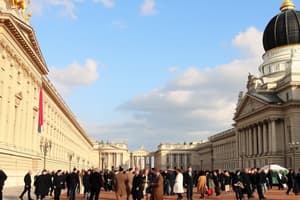Podcast
Questions and Answers
What significant event did the Treaty of Versailles bring to an end?
What significant event did the Treaty of Versailles bring to an end?
- The Cold War
- The Franco-Prussian War
- World War II
- World War I (correct)
Which of the following was a key outcome of the Treaty of Versailles for Germany?
Which of the following was a key outcome of the Treaty of Versailles for Germany?
- Forgiveness of reparations
- Formation of new alliances
- Reduction in military capabilities (correct)
- Increased territorial claims
What was the main purpose of the League of Nations established after World War I?
What was the main purpose of the League of Nations established after World War I?
- To regulate international trade
- To maintain peace and prevent future wars (correct)
- To promote global capitalism
- To support the rise of empires
What cultural innovation did 'Steamboat Willie' introduce?
What cultural innovation did 'Steamboat Willie' introduce?
Which author is best known for using a direct and sparse writing style to address the 'Lost Generation'?
Which author is best known for using a direct and sparse writing style to address the 'Lost Generation'?
What economic policy was Calvin Coolidge particularly known for during his presidency?
What economic policy was Calvin Coolidge particularly known for during his presidency?
Which event is associated with the rise of advertising on home radios?
Which event is associated with the rise of advertising on home radios?
Which tariff was supported by Harding to protect American industries?
Which tariff was supported by Harding to protect American industries?
Flashcards
Treaty of Versailles
Treaty of Versailles
A landmark treaty that officially ended World War I, signed by Germany and Allied powers on June 28, 1919.
League of Nations
League of Nations
A major international organization established after World War I, aiming to prevent future global conflicts through diplomacy and cooperation.
Roaring Twenties
Roaring Twenties
The period after World War I in the United States characterized by economic prosperity, technological advancements, and cultural change.
Return to Normalcy
Return to Normalcy
Signup and view all the flashcards
Teapot Dome Scandal
Teapot Dome Scandal
Signup and view all the flashcards
The Economic Boom of the 1920s
The Economic Boom of the 1920s
Signup and view all the flashcards
Coolidge's 'The business of America is business'
Coolidge's 'The business of America is business'
Signup and view all the flashcards
Talkies in the 1920s
Talkies in the 1920s
Signup and view all the flashcards
Study Notes
Treaty of Versailles
- Ended World War I on June 28, 1919
- Blamed Germany and other allied powers for the war
- Imposed heavy reparations, territorial losses, and military limitations on Germany
- Created new nations
- Contributed to the rise of the Nazi party due to its harshness and blame
Post-War Cultural and Social Shifts
1920s Entertainment
- Movies: Became a popular pastime, with diverse genres including melodrama, westerns, historical epics, romantic comedies
- Talkies (movies with synchronized sound) emerged; Steamboat Willie by Walt Disney was a significant milestone
- Radio: Home radios fostered a unified culture, allowing families to listen to music, news, dramas, and comedies
- Sports: Radio coverage boosted popularity; professional leagues emerged, and major figures like Babe Ruth, Jack Dempsey, Helen Wills, and Bobby Jones gained recognition
1920s Presidents
- Warren G. Harding: Promoted pro-business policies, reduced taxes, and supported tariffs like the Fordney-McCumber Tariff. His presidency was marred by scandals including the Teapot Dome Scandal.
- Calvin Coolidge: Held a hands-off approach to economics, believing "the business of America is business." Reduced taxes and federal spending and aided the stock market's rise.
1927 Mississippi River Flood
- Extreme rainfall and record snowmelt caused the most destructive river flood, affecting Mississippi, Louisiana, Missouri, and Illinois.
- Resulted in over 500 deaths and displacement of over 630,000 people
- Destroyed farmlands and economies
- Demonstrated the need for federal intervention in major disasters.
- Herbert Hoover played a significant part in providing relief
1928 Presidential Election
- Herbert Hoover (Republican) won the election
Stock Market Crash of 1929
- Triggered the Great Depression
- The stock market lost 90% of its value, resulting in widespread unemployment and poverty
Studying That Suits You
Use AI to generate personalized quizzes and flashcards to suit your learning preferences.




